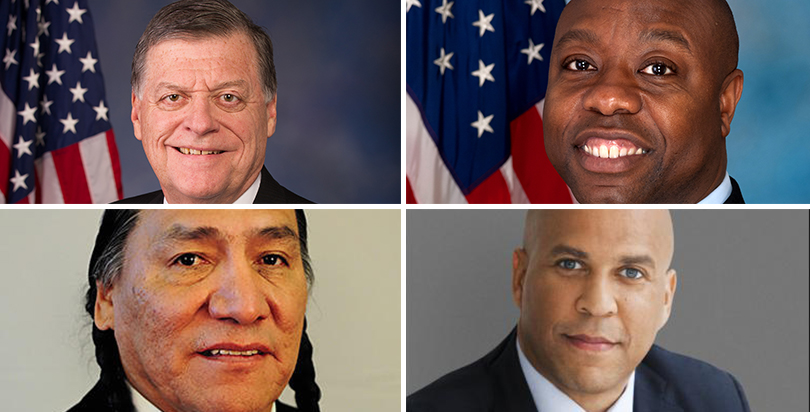National Charter Schools Week to Toast 19 State & Federal ‘Champions’ From Both Parties at Capitol Hill

See our full coverage of National Charter Schools Week
Before he was elected to the Kentucky state legislature, John “Bam” Carney was a longtime educator and coach in Taylor County public schools, teaching social studies and special education. He’s also the father of two teenage sons who embarked on very different educational paths — one is enrolled in a high school vocational program and spends half his day working on a farm; the other spent the second half of his high school career taking college courses and is now a freshman engineering major.
These experiences have shaped his work on education policy since he began serving in the state House of Representatives in 2009, Carney, a Republican, said in an interview. They also factored into his sponsorship this year of a bill to establish charter schools in Kentucky; it was signed into law by Gov. Matt Bevin in March, making Kentucky the 44th state to permit the publicly funded, independently run schools.
“I wanted to convince folks that you could be a supporter of traditional public schools but also of school choice,” said Carney, who has been re-elected four times, running unopposed each time.
“One-size instruction does not fit all students,” he said, “and I felt it was important to bring competition to Kentucky … and give parents and students a choice for something that may fit their needs better.”
Carney is among 19 politicians who are being honored as “charter champions” by the National Alliance for Public Charter Schools during a weeklong, nationwide celebration of charter schools by students and supporters.
Honorees include federal, state, and local representatives on both sides of the aisle who have supported pro-charter legislation or other efforts to expand charter schools. An awards ceremony will be held Wednesday evening at the U.S. Capitol Visitor Center in Washington, D.C.
U.S. Rep. Tom Cole, a Republican from Oklahoma, was nominated in part because of his support for increasing federal funding for charter schools in his role as chairman of the appropriations subcommittee for education. The bipartisan budget deal reached Sunday provides an additional $9 million for federal charter school programs, for a total of $342 million.
In an interview, Cole said charters are a “strategy and an institution that’s proven itself to be very valuable” not only in expanding parents’ choices but also in spurring competition and collaboration with traditional public schools. In Oklahoma, for example, a thriving charter school called Tulsa Honor Academy, authorized by the city school district, is considered “part of the Tulsa Public Schools family,” the superintendent told The 74 in an interview last year.
Cole said the next challenge for charter supporters will be the school funding conflict in President Donald Trump’s initial budget proposal: While the commitment to increase charter funding is welcome, Cole said, a proposed $9 billion cut to the Education Department budget overall will be a tough sell. By contrast, in the deal hammered out Sunday, lawmakers proposed a $1.2 billion cut.
“That’s going to be very hard,” Cole said of the president’s figure. “I don’t think that, in that form, is likely to make it through Congress. And in that sense, I don’t think the administration means to do this, but they’re pitting charter schools against the public school system in terms of a battle over resources, and that’s a fight that I don’t think will ultimately serve either the public school system or charters very well.”
Cole said he’s looking forward to hearing Education Secretary Betsy DeVos’s testimony on her budget priorities later this month, when the full budget proposal is expected to be released.
In an op-ed published by The 74 this week, National Alliance for Public Charter Schools President and CEO Nina Rees also touched on the theme of interconnectedness between traditional public schools and charters.
“Leaders of the charter school movement also understand that our success depends on the success of the entire public school ecosystem,” she wrote, also saying that she commended President Trump for increasing charter funding.
“But we also urged the president to protect other effective programs that help all students access a great education, regardless of which school they choose,” she said.
National Charter Schools Week comes on the heels of two victories for advocates: Charter schools dominated the top 10 list of “best public high schools” in U.S. News and World Report’s annual rankings (most were part of the BASIS network in Arizona); and the 2017 National Teacher of the Year award went to a charter school teacher for the first time.
Charters proponents didn’t win everywhere, however. Virginia Sen. Mark Obenshain, a Republican, sponsored a bill designed to expand charter schools in areas of that state with low-performing schools. Virginia has nine charter schools, among the fewest of any state. Although the bill attracted bipartisan support, it was vetoed by Democratic Gov. Terry McAuliffe, who said it would strip local school boards of authority, The Washington Post reported.
Obenshain said he has fought for pro-charter legislation nearly every year since being elected in 2004.
“It is a real honor to be be named,” he said. “I wish I was being named in connection with a successful effort to establish a new foundation for charter schools in Virginia, and I hope that in the next few years we’ll be able to claim that.”
Rounding out the events this week: A Hall of Fame induction on Thursday will recognize three honorees for their pioneering contributions to the growth of charter schools. Friday is national College Signing Day, and charter schools around the country will join the Reach Higher initiative (launched by former first lady Michelle Obama) to celebrate students heading to college.
2017 “Charter champions” named by the National Alliance for Public Charter Schools
State Assemblyman Daniel Burke, Democrat of Illinois
Gov. Matt Bevin, Republican of Kentucky
State Rep. John “Bam” Carney, Republican of Kentucky
State Sen. David Givens, Republican of Kentucky
State Rep. Jeff Hoover, Republican, Speaker of the House of Representatives of Kentucky
State. Rep. Phil Moffett, Republican of Kentucky
State. Rep. Jonathan Shell, Republican of Kentucky
State Sen. Steven West, Republican of Kentucky
State Sen. Mike Wilson, Republican of Kentucky
State Rep. Jonathan Windy Boy, Democrat of Montana
State Assemblyman Troy Singleton, Democrat of New Jersey
State Sen. Anthony H. Williams, Democrat of Pennsylvania
U.S. Sen. Cory Booker, Democrat of New Jersey
U.S. Rep. Tom Cole, Republican of Oklahoma
Mayor James Diossa, Democrat of Central Falls, Rhode Island
Sen. Tim Scott, South Carolina
State Delegate R. Steven Landes, Republican of Virginia
State Sen. Mark D. Obenshain, Republican of Virginia
State Sen. J. Chapman Petersen, Democrat of Virginia
Get stories like these delivered straight to your inbox. Sign up for The 74 Newsletter

;)
